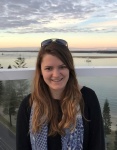

Pam Engelberts
j.engelbertsOLD@uqconnect.edu.au
PhD
School of Chemistry and Molecular Biosciences

Pam Engelberts
j.engelbertsOLD@uqconnect.edu.au
PhD
School of Chemistry and Molecular Biosciences
From the cradle to the grave: Establishing Ianthella basta as a model species for sponge symbiosis research
Pam performed her Masters in Freshwater and Marine Biology at the University of Amsterdam (The Netherlands). During her Masters, Pam came to Australia to work with Dr. Nicole Webster and Dr. Steven Robbins on the sponge microbiome, where she looked at the functional potential of the microbial community associated with the tropical reef sponge Ircinia ramosa. After finishing her Masters in 2018, she came back to Australia for a PhD. Working on marine sponges again, she combines metagenomics with functional tools to unravel the role of microbes in the functioning of sponges, ultimately establishing a model species for sponge symbiosis research.
From the cradle to the grave: Establishing Ianthella basta as a model species for sponge symbiosis research
2019 to 2023
Project Description
This project aims to 1) close the genomes of Ianthella basta symbionts, 2) characterise the microbial community throughout the life cycle of Ianthella basta, 3) characterise the microbial community of animals associated with Ianthella basta (i.e. a holothuroid, polychaete, and goby), and 4) measure microbial and host activity under temperature stress in Ianthella basta.
Project Importance
Sponges are ecologically important constituents of coral reefs as they occupy up to 50% of the substrate, provide a nursery habitat, and recycle nutrients through the filtration of large quantities of water. Underpinning their functioning are millions of microorganisms that live in close association with the sponge, comprising up to 35% of the sponge biomass. Establishing one model species for sponge research is essential to understand this symbiosis and the functioning of sponges on the Great Barrier Reef as well as their stability under future climate change conditions.
Project Methods
Fluorescence in situ hybridisation, next generation sequencing, and long read sequencing will be performed at the Australian Centre for Ecogenomics to visualise the microbial symbionts in the tissue of Ianthella basta and its associated animal symbionts and to close the microbial genomes, respectively. Sponge spawning and temperature stress experiments will be performed in the AIMS SeaSimulator.
Project Results
This project will result in the establishment of a model species for sponge symbiosis research. Futhermore, it will provide insight into microbial transmission in Ianthella basta and the activity of the microbiome and host under increasing sea water temperatures.
Keywords
Bacteria,
Climate change,
Controlled Environment,
Coral reefs,
Ecology,
Field based,
Genetics,
Interaction,
Manipulative experiments,
Microbiology,
Molecular techniques,
Porifera (sponges)